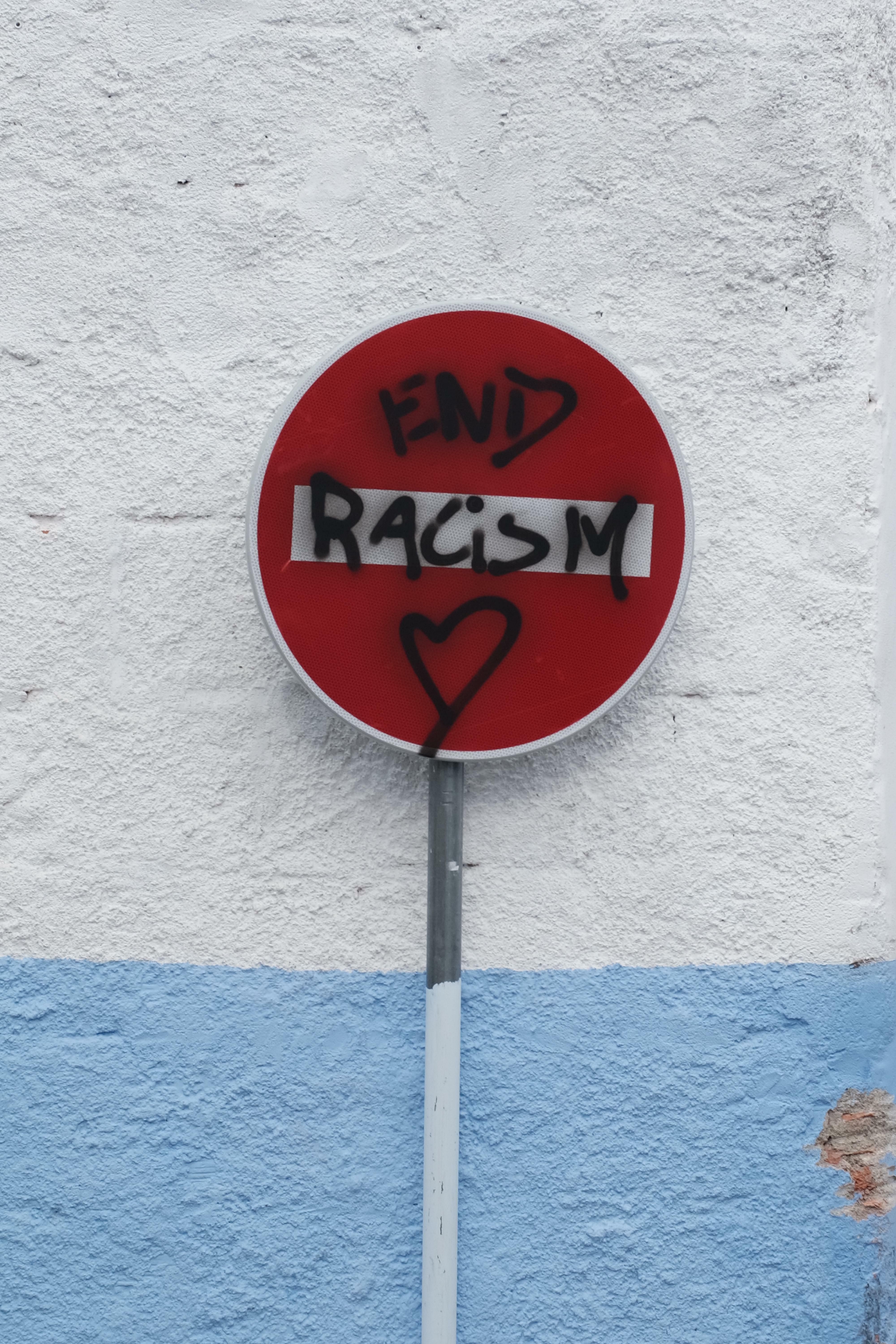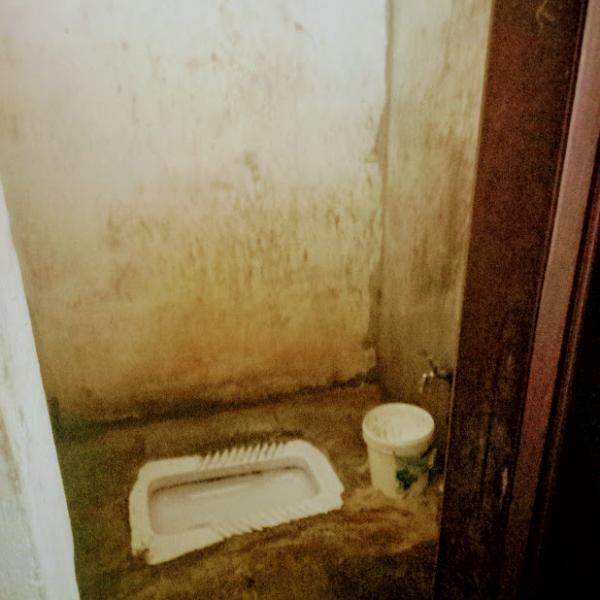
8 minute read
Injustice exposed bare
Figure 6: End racism sign in the city of Beja.
A parallel discussion among migrant workers seeks to connect problems of dignity and recognition to conversations of equity and redistribution through the embodiment of the toilet. Here these debates grow out of a broader historical context.
Advertisement
In the area where migrant workers consist of a large population, what permeates the air is not Portuguese but a mixture of Hindi, English, Nepali and other languages. But these faces are still rarely seen in the town's traditional Portuguese shops and restaurants. Where did they go? Actually, migrant workers living in this area often experience hatred, marginalisation, xenophobia and racial discrimination. It is becoming extremely difficult for them to access public toilets outside their own dorm.
Xenophobia . 18
The increasing prominence of immigrants working in Portugal has led to attitudes and feelings related to the possible economic threat posed by these immigrants; that is, they are taking jobs away from the Portuguese and absorbing too many national resources from the Portuguese. Local Portuguese residents have rumours of resentment and fear that Portugal's growing far-right may take advantage of this , as happened in other countries in Europe. But the local NGO principal is 19 hopeful - he believes people will adapt in time.
In December 2021, the Reuters reported police violently physical abuse against Portugal migrant workers and said that those responsible must be punished20. The news was shocking Portugal at that time. In a video released by CNN Portugal, the police forced an immigrant to inhale pepper spray with a forged alcohol tester and verbally abused him. Another video taken by the police in the police station showed that they beat the immigrants' hands with a ruler. Other photos showed police kicking and punching an immigrant in the face. The incidents took place in 2019 in the municipality of Odemira; their agriculture production relies mainly on migrant labour from Southeast Asia to operate. This is not a single isolated tragedy.
Such phenomenon has provoked us to see the core reason for using the toilet as a way of representing, what role the toilet plays when it comes to the injustice and exploitation of migrant
'Xenophobia' vs. ‘Racism’. https://www.merriam-webster.com/words-at-play/xenophobia-and-racism-difference18
In Portugal, Asian workers pick fruit and live precariously. https://www.aljazeera.com/features/2020/11/23/south-asian-workers-portugal19
Alleged police abuse against migrant workers shocks Portugal. https://www.reuters.com/world/europe/alleged-police-abuse-against-migrant-20 workers-shocks-portugal-2021-12-17/
workers globally, and how these bloody experiences help us better understand what they are experiencing in terms of exploitation and injustice and the relationship between capital and vivid, lively individuals.
Saudi authorities often arrest those found working illegally in Saudi Arabia without a visa. Many are held in Al shumaisi, a vast complex designed to accommodate 32000 prisoners21. The detainees are kept in a series of crowded bunk bed halls, each of which can accommodate about 80 people. Several prisoners interviewed said that their phones were confiscated when they arrived, making it impossible for them to record their living conditions. "We are packaged as animals. We sleep in metal beds without mattresses and proper sanitation," one migrant worker told the Guardian through an interpreter. "We drink water from the toilet. If you have money, you can buy clean water. If not, you can take dirty water from the toilet.”
I'm helpless. There's nothing I can do.
“You can sleep with bricks. Make it your pillow. Sorry. “
Here, the toilet has deviated from its own function and has become a solid testimony to uncovering the authority’s contempt for human rights, the government’s mismanagement, and their lack of response to the epidemic. Such functionalised public toilets have unpacked the core issue that largely existed globally: indifference towards fundamental rights. Not just India, the domestic migrant workers(who move from rural areas to city) in China live in a public toilet
In Hangzhou, 5 Chinese have settled public toilets as their home based on media reports . They are 22 believed to have lived there for several months, and the toilet is now equipped with a bed, cooking facilities and a TV. During the interview from the media report, One of the women said she was unable to rent or pay for everyday living expenses. Their situation highlights the low wages and living conditions of many migrant workers in China.
'We drink from the toilet': migrants tell of hellish Saudi detention centres. https://www.theguardian.com/global-development/2020/aug/04/we-drink-21 from-the-toilet-migrants-tell-of-hellish-saudi-detention-centres
Chinese migrant workers live in toilet. http://news.bbc.co.uk/1/hi/world/asia-paci22 fic/8493743.stm.
Strong smell
"We are used to the strong smell of urine. The worst thing is that people have been stealing my stove and cooking utensils,” Ms AI, who lives in the women's toilet, told the Zhejiang morning post. ”The bad thing is that there are mice everywhere," she said. It is reported that local residents in Hangzhou sympathise with the plight of migrant workers and usually avoid using these facilities. But some people are still surprised by the new residents of the toilet. "When I ran into the bathroom, I was stunned and saw several people sitting around, chatting or doing things," Mr Du told the newspaper. One of the migrant workers even said that one of her friends envied her a little because she could rent accessible toilets. But a spokesman for the local council warned: "it is forbidden to live in toilets because the public should use them.”
Where has decency gone?
Migrant workers in Portugal primarily work on the intensive farming sector, including olive picking on a seasonal contract. This constantly moving character of their work determines that it would be tough to find a toilet when they are in the working environment. We know going to the loo is subconscious behaviour and not under human self-control. Subsequently, It has brought them substantial psychological problems that every single one of us would have. Poo shame is real. It has a technical term: Parcopresis or 'shy bowel syndrome . Parcopresis is a psychological problem 23 which falls under the umbrella of social anxiety disorders. It is the inability to go for a poo in places that lack privacy where other people are perceived or likely to be around . People who experience 24 it have a fear of defecating in situations where they might be overheard, or ‘over-smelled', and that fear creates an inhibition that makes them unwilling to use public restrooms; in extreme cases, it may be so disabling that people are unwilling to travel any distance from home lest they be caught in a place where they are unable to 'go' . 25
As a place beyond the definition of architecture, the toilet is a blurred stereotype guidebook that distinguishes and divides human beings into different "types": Male/female, disabled, sexual orientation, children/adults? Subsequently, division, separation and denial are the central themes of
Parcopresis. https://www.bba.mindovergut.com/shy-bowel/23
Parcopresis and social anxiety disorder. https://www.bba.mindovergut.com/parcopresis-and-social-anxiety-disorder/24
Can’t Poop At Someone Else’s Place? You Might Be Suffering From Parcopresis. https://www.re25 finery29.com/en-ca/2020/10/10138073/why-cant-ipoop-parcopresis
public toilets. Here in the cities where large migrant workers are allocated, the pattern has gone far beyond these separations; the situation for migrant workers’ toilet access has grown over gender and sexual boundaries. According to our ethnicity, age, religion, and personality, dress decently and appropriately. They are forced to fit in the racial pattern.
But also the public toilet is a place where we meet with the public and where we interact with the public. So public toilets are not only ambiguous and contested spaces, They are places for excretion and defecation, for adjusting one’s appearance including washing ourselves, or changing one's clothes. This is the vital social functional aspect that migrant workers are missing. It is about the decency of society and life. The question here isn’t our use of public toilets is an encounter with many other individuals, because we interact on a daily basis with each other who may be or even very different from each one of us. Still, at least the isolated relationship between local people and foreign workers are sharing some in common- our physical instinct and needs.
Can they be part of the engagement instead of hiding?
Most of the toilets have introduced anonymity. Still, people are worried about having to share intimate space with migrant workers who hold a state of mind of hostility towards outsiders, and consider that the non-local people may make them anxious and want to stay close. Using this tension as a springboard, and unpacking this form of social relations, the core of this layer of relation is not limited to humans. But should be traced to the resource itself which is the toilet, which contains the interrelated ethical and political dynamics of all things around. This requires a fundamental engagement regarding the information itself.
As previously mentioned in the essay, that is the way workers gain and distinguish information that is one reason they were created by the mafia before coming to Portugal to suffer from such conditions. This phenomenon unfolds a large issue: the existence of information barriers and justified equal knowledge access. Subsequently, in the book right to research, the author discussed issues surrounding dialogues, specifically the content of education as the practice of freedom and the methodology being brought up through investigation. We should hold a sceptical opinion towards the logic of the present system, more specifically, how we are being forced to accept injustice.
This requires another way of thinking; the practice of intensive agriculture within that tension and complicity, in the end, opens more complicity. They are fundamentally unpacking ideas and terminology through the possibility of something that its conclusion opens up new questions. People are faced with questions that ought to translate their own local experiences, including but not limited to the toilet, and how it is permeated by global forces and factors at a more significant content.
Whatever the setting or scale of the problem, we have in the toilet an instrument and institution that both reflects how people and societies operate and also reinforces the existing pattern. Precisely because the toilet operates somewhat in hiding, those who plan, manage and control its use often act on their own, without a public to which they must provide detailed and explicit accounts of what they are doing. The toilet thus operates irresponsibly. Compared to other artefacts, arrangements, and patterns of usage, it, therefore, resists change.




